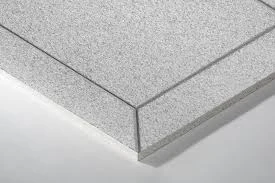Nov . 18, 2024 15:19 Back to list
pvc vs gypsum ceiling
PVC vs. Gypsum Ceilings A Comprehensive Comparison
When it comes to choosing the right ceiling material for your home or commercial space, two popular options often come to mind PVC (polyvinyl chloride) and gypsum. Each material has distinct characteristics, advantages, and disadvantages, making them suitable for different applications. In this article, we will delve into the features, benefits, and drawbacks of both PVC and gypsum ceilings to help you make an informed decision.
Understanding PVC Ceilings
PVC ceilings are made from polyvinyl chloride, a type of plastic that is widely used in the construction industry due to its versatility and durability. PVC ceiling panels are lightweight, easy to install, and come in a variety of designs and colors, allowing for extensive customization options. They are often used in spaces where water and humidity are a concern, such as bathrooms and kitchens, simply because they are resistant to moisture and do not warp or mold.
Another advantage of PVC ceilings is their ease of maintenance. They are easy to clean and require minimal upkeep; a simple wipe down with a damp cloth is usually enough to maintain their appearance. Additionally, PVC ceilings can be more cost-effective in the long run due to their durability and resistance to damage.
Advantages of PVC Ceilings
1. Water Resistance PVC ceilings do not absorb water, making them an excellent choice for high-moisture areas. 2. Lightweight The lightweight nature of PVC makes installation quick and easy, often requiring less labor. 3. Customizable With a plethora of colors, textures, and design options, PVC ceilings can suit various interior aesthetics. 4. Low Maintenance Cleaning is simple, and the material does not require repainting or sealing.
Disadvantages of PVC Ceilings
1. Heat Sensitivity PVC can warp if exposed to extreme temperatures, which may limit its use in some environments. 2. Environmental Impact Being a type of plastic, the production and disposal of PVC can have negative environmental effects. 3. Limited Sound Insulation PVC does not provide excellent sound insulation compared to other materials.
pvc vs gypsum ceiling

Understanding Gypsum Ceilings
Gypsum ceilings, on the other hand, are made from gypsum plasterboard (also known as drywall or Gyproc). These ceilings are common in residential and commercial settings due to their fire-resistant properties, durability, and ability to provide good sound insulation. Gypsum ceilings can be finished in various ways, such as painting, plastering, or applying decorative elements.
One of the main benefits of gypsum ceilings is their aesthetic appeal. They can be shaped and molded to create intricate designs and can also be used to make dramatic architectural features like drop ceilings or false ceilings. Additionally, gypsum is non-combustible, providing an added layer of safety.
Advantages of Gypsum Ceilings
1. Fire Resistance Gypsum ceilings have inherent fire-resistant properties, making them a safe choice for many applications. 2. Sound Insulation They provide good sound insulation, which is especially advantageous in residential and commercial buildings where noise reduction is desired. 3. Versatile Finishing Gypsum can be painted or treated to fit various design needs, offering a sophisticated look.
Disadvantages of Gypsum Ceilings
1. Susceptibility to Moisture Gypsum can absorb moisture, which may lead to mold growth and deterioration in high-humidity areas unless treated properly. 2. Heavy Material Gypsum ceilings are heavier than PVC ceilings, which may complicate installation. 3. Maintenance Repairing a damaged gypsum ceiling can be more complicated compared to a PVC ceiling.
Conclusion
In conclusion, the choice between PVC and gypsum ceilings largely depends on the specific needs of your space. If you prioritize water resistance, low maintenance, and ease of installation, PVC may be the better option. However, if you are looking for fire-resistant properties, sound insulation, and aesthetic versatility, gypsum ceilings could be the ideal choice. Ultimately, understanding the unique characteristics of each material will empower you to make an informed decision that best suits your project.
-
Quality Ceiling Trap Doors & Access Panels | Easy & Secure AccessNewsAug.30,2025
-
Durable Ceiling T Grid Systems | Easy InstallationNewsAug.29,2025
-
PVC Gypsum Ceiling: Durable, Laminated Tiles for Modern SpacesNewsAug.28,2025
-
Pvc Gypsum Ceiling Is DurableNewsAug.21,2025
-
Mineral Fiber Board Is DurableNewsAug.21,2025
-
Ceiling Tile Clip Reusable DesignNewsAug.21,2025







